That would, of course, be a huge invasion of privacy, but it would technically be possible, and that's thanks to Windows' open nature and the reported lack of security around stored Windows Recall data. Even your employer could build a tool that's preloaded onto your work laptop that's designed to scrape that data. It's all quite concerning.
The fact that Windows is an open platform means anyone can do anything if they want to. That's a blessing and a curse, and it means an app like Recall, in an unencrypted state, doesn't really work on Windows currently.
On iOS and iPadOS, users are locked out of important system files, and app developers are sandboxed and have no ability to read or modify system files outside of documented APIs. So, if iPadOS had its own version of Recall, that data could be stored unencrypted and still be safe from third-party attackers. It's the same story on Android.
Windows enjoys no such luxury, so Microsoft needs to put extra effort into ensuring Windows Recall is secure. It needs to ensure that only the Windows Recall app can read and understand that data. If that data is unencrypted, anyone can read it. Everything it collects is reportedly stored in a plaintext SQLite database, making it easy to parse information from it.
People won't trust Windows Recall regardless of how the data is stored locally.
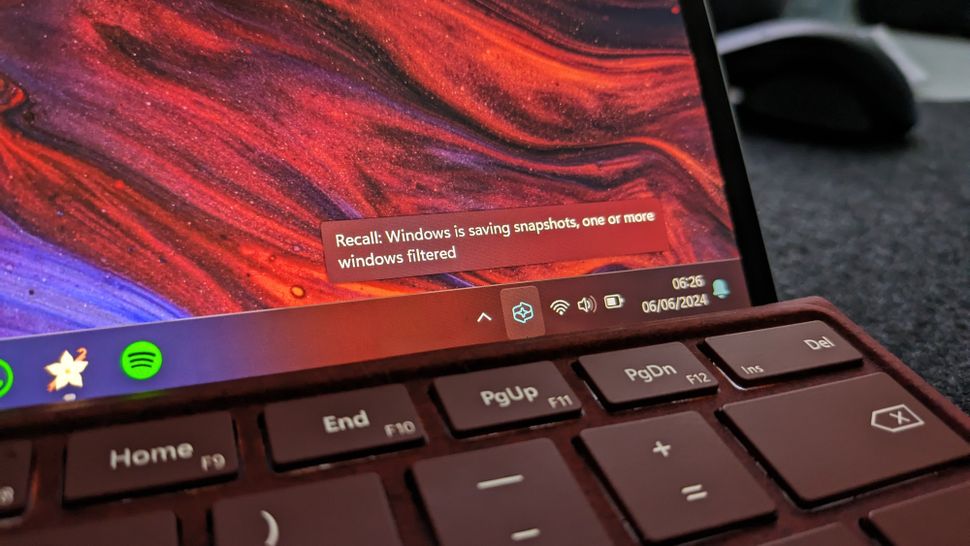
Windows Recall can't run secretly, as it places a visual indicator on the Taskbar that cannot be removed when it's enabled.
(Image credit: Windows Central)
There's quite a bit of hysteria over the discovery that Windows Recall stores data unencrypted. It's important to remember that Windows Recall isn't actually out yet, so Microsoft could update Windows Recall before launch to address this, or perhaps even potentially delay the feature to ensure security.
Assuming Microsoft does eventually fix these security concerns, I don't think that's going to change much for people. Many have already assumed the worst; that Windows Recall will eventually be used as a means to sell data to advertisers and train AI models, and that if it's not happening today, it's only a matter of time.
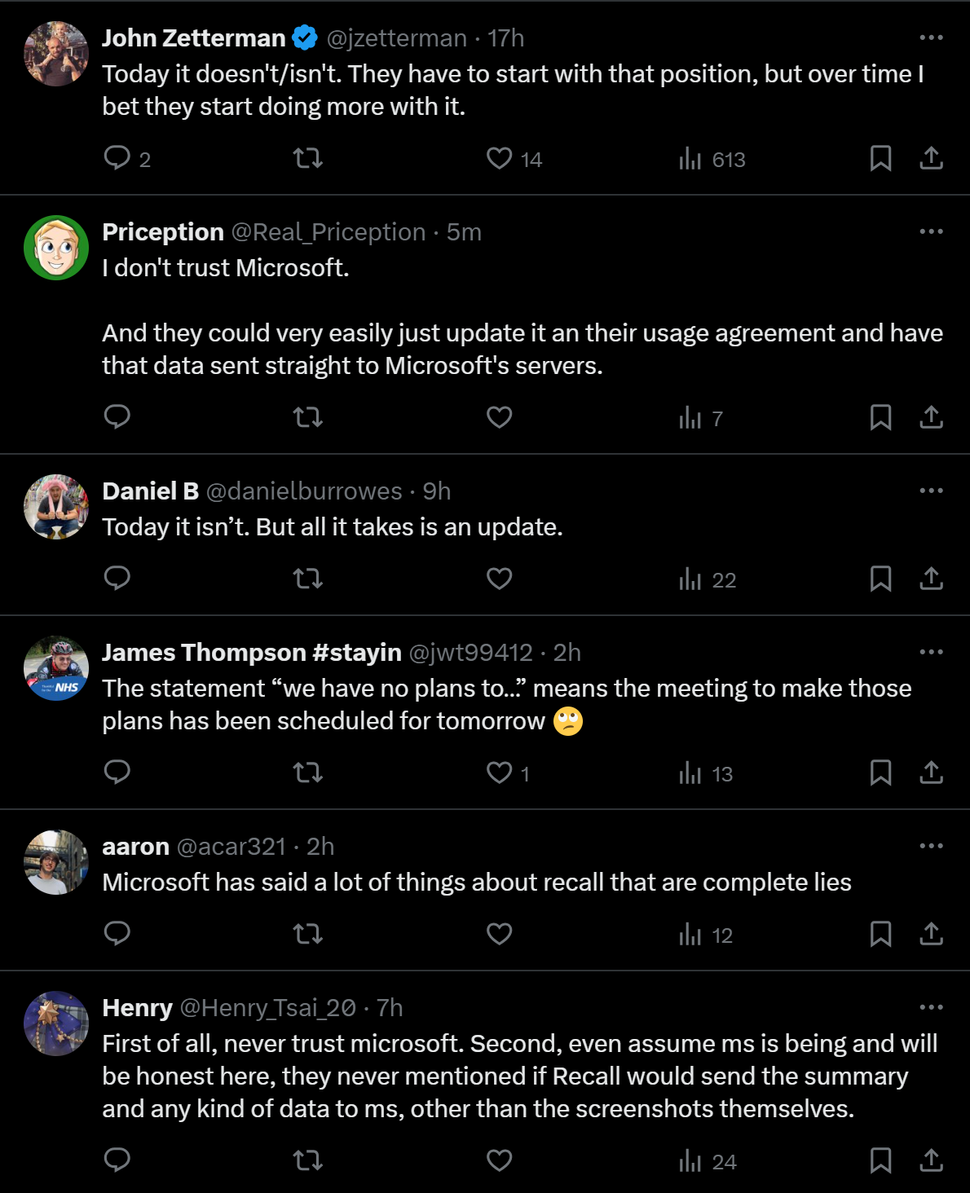
People think Microsoft are lying about Recall not uploading data to the cloud.
(Image credit: Windows Central)
Many are even convinced that Microsoft will attempt to enable Windows Recall on PCs that have chosen not to use it via updates down the line. That's just the sort of company people think Microsoft is like. I think this stems from the fact that people don't understand how Windows Recall works.
Microsoft has built a number of safety features into Windows Recall to ensure that the service can't run secretly in the background. When Windows Recall is enabled, it places a permanent visual indicator icon on the Taskbar to let the user know that Windows Recall is capturing data. This icon cannot be hidden or moved.
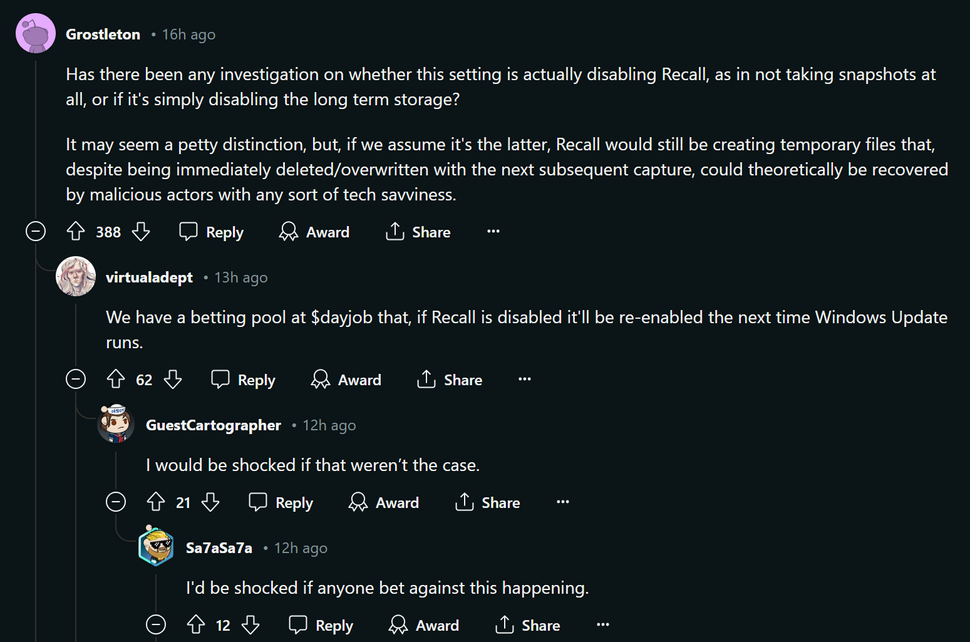
People are ready to assume Microsoft will enable Windows Recall in a future update.
(Image credit: Windows Central)
It's also important to remember that Microsoft has no monetary incentive to force people to use Windows Recall. The data it collects is of no value to Microsoft, as it can't see any of it. Windows Recall is a selling point for new hardware, built as a means to improve user productivity, not sell advertising. But that's hard for people to believe, and perhaps that's rightly so.
With that in mind, there would be no reason for Microsoft to automatically enable Windows Recall in an update down the line. If it does happen, the user will be able to instantly tell thanks to that that visual indicator and turn it off again.
Microsoft chose to keep Windows Recall a secret, and that hasn't helped things.
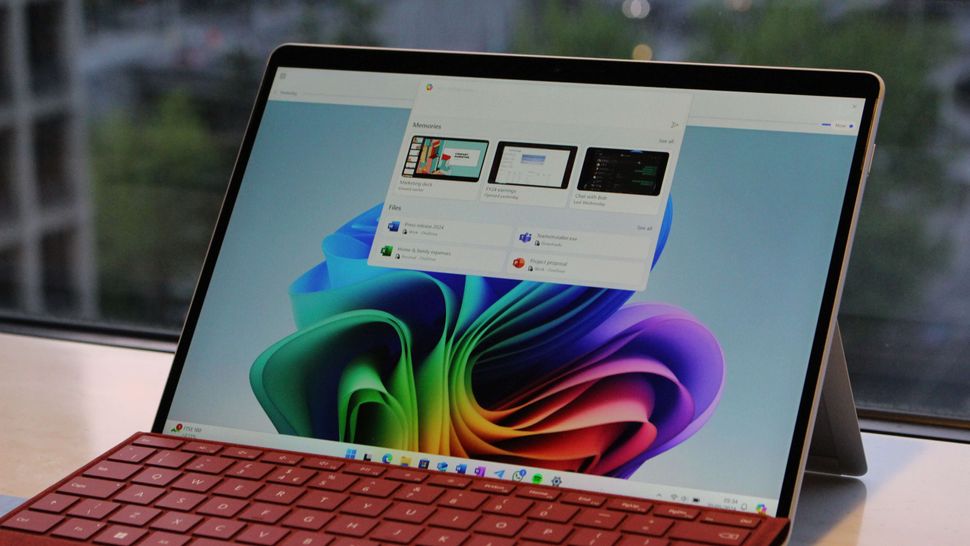
Windows Recall went through several iterations internally... and public testing could have helped spot issues.
(Image credit: Windows Central)
Some insider baseball here, but for some reason Microsoft was overly secretive about Windows Recall during development. It didn't want anyone to know about it. If you wanted to test the feature internally, you needed to be accepted into a tented program first, which I understand wasn't easy to get into. When I leaked the existence of Windows Recall (AI Explorer) and Copilot+ PCs (CADMUS) back in December 2023, I heard from sources that the company wasn't pleased.
Microsoft has the Windows Insider Program, yet to maintain secrecy, it chose not to test this feature openly. I can't think of a single feature that would have benefitted from public testing more than Windows Recall. This is the kind of feature that needs to be built in the open so that users can learn to trust you with it.
Had it been tested openly, these security concerns would have definitely been pointed out well ahead of general availability, and likely fixed before mass hysteria could ensue. Of course, the true reason Windows Recall wasn't tested openly was because the company wanted to make it exclusive to new Copilot+ PCs, and you can't really do that if you're testing the feature on existing PCs where it works quite well.
Microsoft also wanted to keep Windows Recall a secret so it could have a big reveal on May 20. Except, it wasn't really much of a big reveal. Many of us in the tech press already knew it was coming, even without being briefed on the feature ahead of time.
You can't have Windows Recall anyway
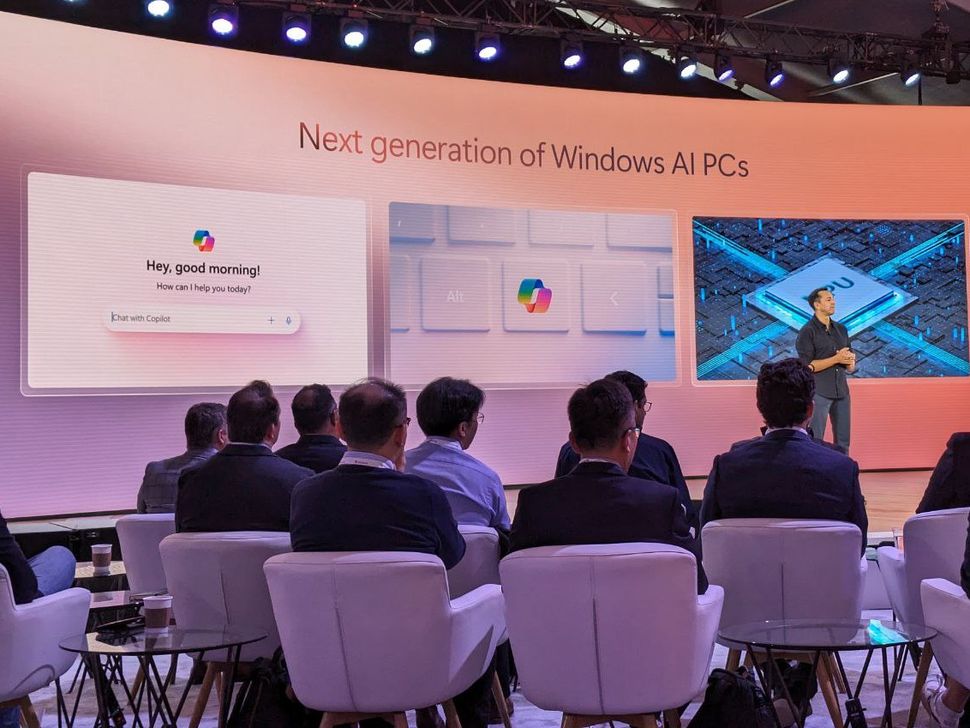
Windows Recall is only enabled on new hardware.
(Image credit: Windows Central)
Ultimately, you can't have Windows Recall anyway. It's a feature reserved exclusively for new PCs shipping under the Copilot+ umbrella, which means if you want to use it, you'll have to buy a new device with a neural processing unit (NPU) that can output 40 TOPS of power first. Your existing Windows 11 PC is not eligible to run Windows Recall and very likely never will be.
That's good news for those who don't want Windows Recall, as it means there's nothing you need to do to avoid it. Just keep using your existing device, and you should be safe from the all-seeing eye that is Windows Recall.
If you do happen to acquire a Copilot+ PC, you can choose not to use Windows Recall. There's some discourse around the feature being potentially enabled by default, but I'm told via sources that this is being reconsidered. I suspect Microsoft will give the user a choice to turn Windows Recall on or off during the setup process on Copilot+ PCs.
If it doesn't, that's just another bad Windows practice to add to the list.
It's a shame because Windows Recall is really good.
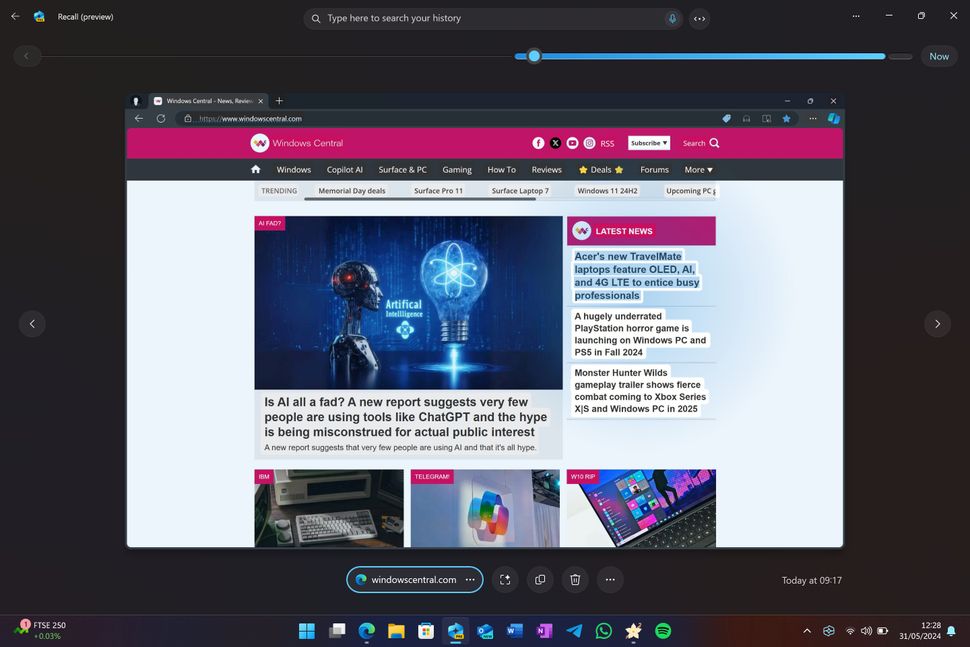
I've really enjoyed using Windows Recall over the last week.
(Image credit: Windows Central)
I think it's fair to say that a feature can be both insecure and good at what it does. That's Windows Recall for me right now. I've been testing it over the last week, and it's a great tool for finding things you only half remember, or have deleted, accidentally or otherwise.
In fact, it came in clutch for this very article. I had deleted a paragraph earlier in the day as I didn't think it was relevant, only later to realize I could reuse that paragraph elsewhere in the story. On a normal PC, that paragraph is gone, and I'd have to rewrite it from scratch. But with Windows Recall, I was able to go back to that point in time when I originally wrote it, copy it from there, and paste it back into my CMS.
The ability to search for things using natural language is genuinely great, and it works really well for a 1.0 product. But there's a very dark cloud hanging over this feature right now, and a lot of privacy conscious people are simply not going to be able to subscribe to the idea of Windows Recall in its current form.
Microsoft told me at the event where Windows Recall was announced that it plans to rapidly update this feature now that it's shipping. I suspect this means we will see new features and capabilities added to Windows Recall over the coming months, along with updates to ensure the data it collects is secure on the device.
What happens now?

Microsoft is the villain in many people's eyes.
(Image credit: Windows Central)
So what happens now? Will Microsoft delay Windows Recall, or maybe even cancel it? Will people ever be able to trust it?
I don't think Microsoft will delay or cancel it. I think Windows Recall will ship on June 18 as was originally announced, with the promise of an update coming shortly after to fix the security concerns people have with it.
With Windows Recall being exclusive to Copilot+ PCs, I imagine the number of PCs that could even be targeted with Recall malware over the next few months will be in the low thousands, which gives Microsoft some time to update Windows Recall with better security before more people adopt Copilot+ devices.
I definitely think Microsoft will make Windows Recall an optional feature that you can choose to enable or disable during Windows setup. It would be a really bad look to have it as opt-out rather than opt-in at this current time.
Windows Recall is a feature that ships as part of Windows 11 version 24H2, which technically won't be generally available until this fall for existing PCs. Even when that happens, Windows Recall won't be enabled on your existing device.
Source
Hope you enjoyed this news post.
Thank you for appreciating my time and effort posting news every single day for many years.
2023: Over 5,800 news posts | 2024 (till end of May): Nearly 2,400 news posts
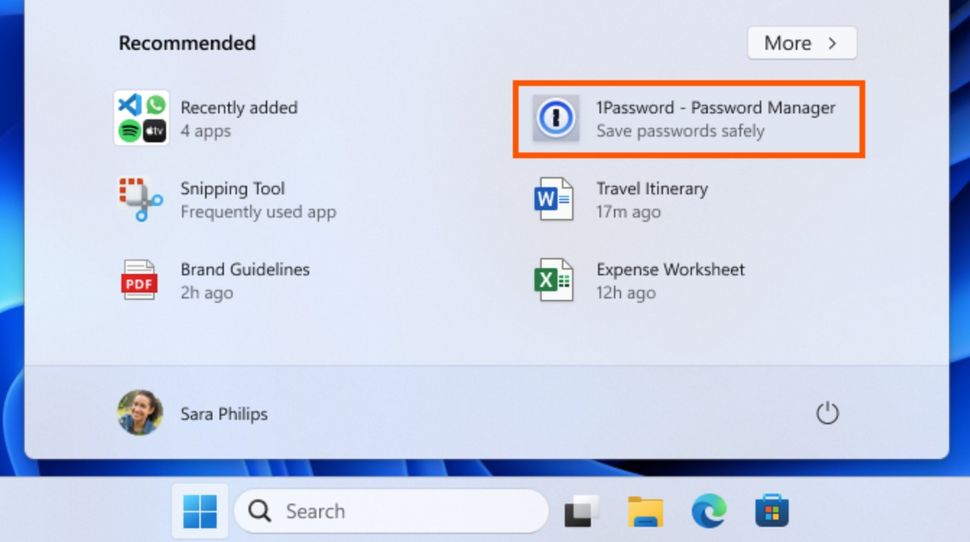


 1
1


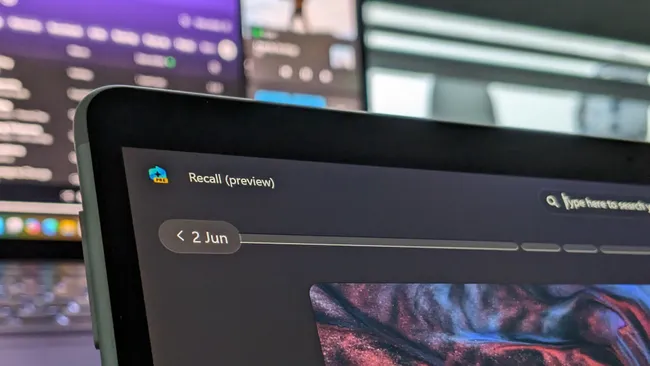
3175x175(CURRENT).thumb.jpg.b05acc060982b36f5891ba728e6d953c.jpg)
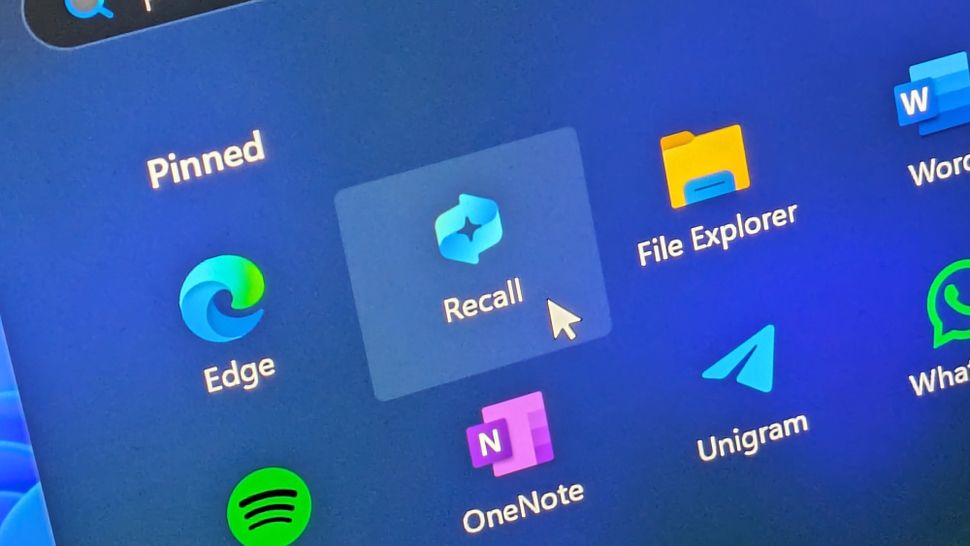







Recommended Comments
Join the conversation
You can post now and register later. If you have an account, sign in now to post with your account.
Note: Your post will require moderator approval before it will be visible.